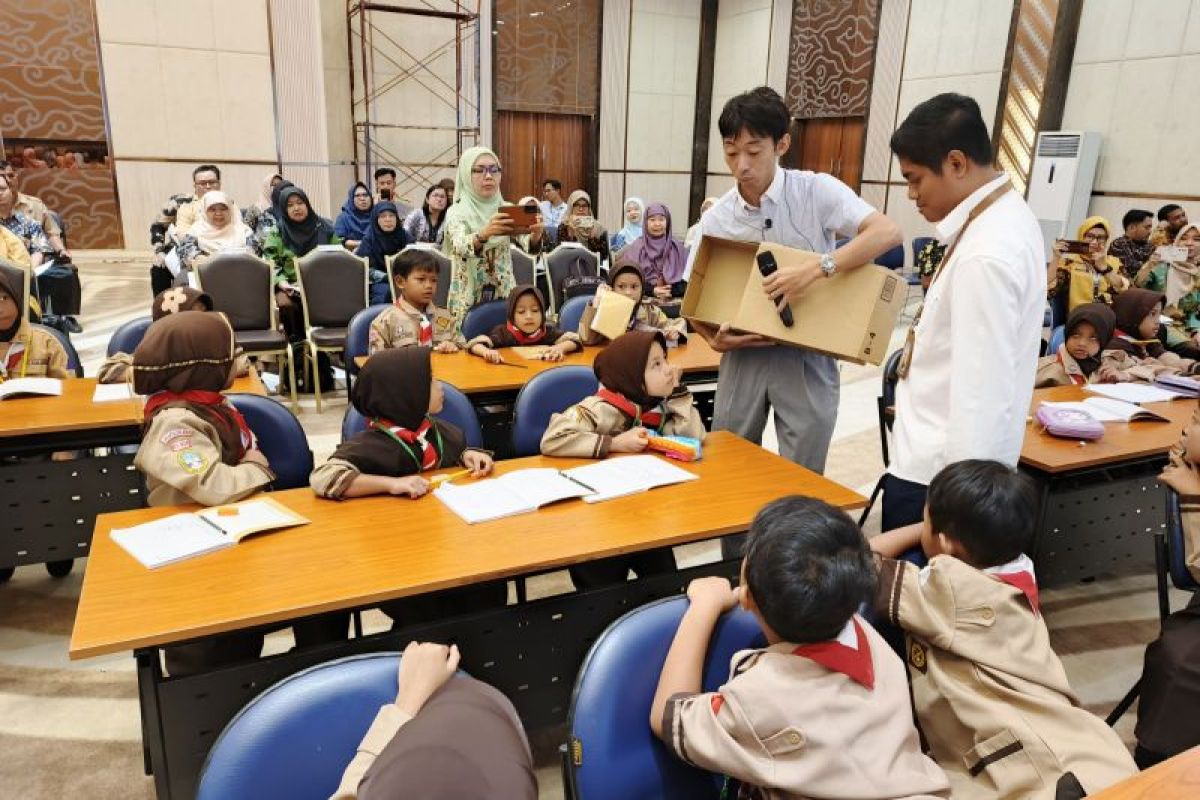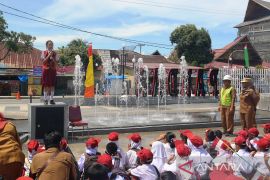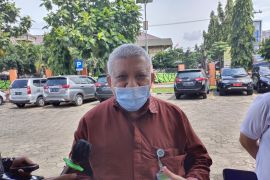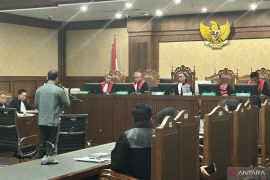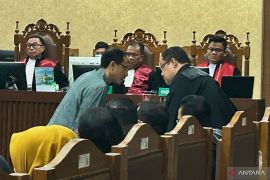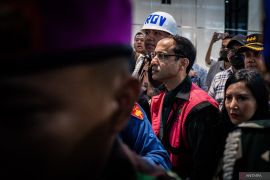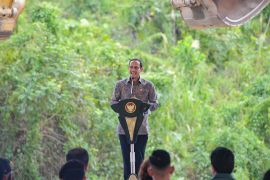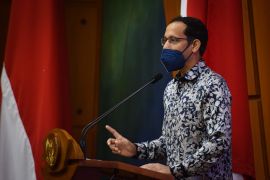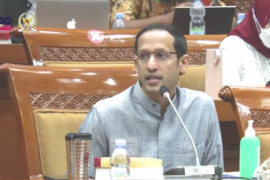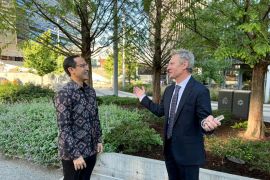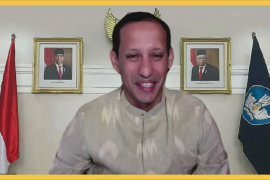"Merdeka Curriculum focuses on the depth of learning over speed. Hence, teachers should no longer be rushed to finish a learning material to jump to plenty of other materials in line,” Makarim stated.
The minister also explained that the Merdeka Curriculum, or Freedom Curriculum in its literal translation, is one of the government’s initiatives expected to help Indonesia address matters related to the learning crisis and learning loss caused by the COVID-19 pandemic.
The curriculum, gradually implemented since 2021, also stipulates that providing children with proper education is not only the responsibility of school teachers, as parents are equally entitled to guide children in their learning journey at home.
The Indonesian Ministry of Education, Culture, Research, and Technology has showcased parents’ involvement in their children’s education by arranging a digital exhibition titled “Story Portraits of the Merdeka Curriculum” as part of the Merdeka Curriculum Festival 2024.
At the digital expo, people can view various pictures and videos submitted by teachers, students, and parents. In the parents category, the ministry is displaying 45 pictures and videos telling inspiring stories about parents' efforts to educate their kids at home, complementing the lessons offered by schools to impart education more effectively.
The ministry organized the online exhibition to highlight the need for all parties to play an active role in educational processes to produce talents that will bring the nation closer to realizing the Golden Indonesia 2045 vision.
Of the 45 creative works exhibited, six have been highlighted as chosen stories, with a star symbol placed on the top left corner of their thumbnails. One of the selected stories is a picture, titled “Fun Storytelling with My Father,” submitted by Tri Sujarwo from Metro City, Lampung.
The picture depicts Tri using a hand puppet named Bruno to perform ventriloquism to tell a story to his son, Albiruni. Tri said storytelling with a puppet can help lighten up the story, making it more exciting for his kid.
He remarked that ventriloquism has made it easier for his child to understand the moral value he always incorporated into every story told, eliminating the patronizing sense.
According to Tri, storytelling can be regarded as one of the most viable options for parents to support the implementation of the government’s Merdeka Curriculum, which emphasizes the need for parents to play a bigger role in enriching children’s knowledge banks outside schools.
Another chosen story was submitted by Hastuti Madyaning Utami, a mother from Banjarnegara Central Java. In the picture displayed, Hastuti and her husband are seen reading books with their children, one of whom is a kindergartener named Azzam.
Hastuti said she has been cultivating the habit of reading books for at least 15 minutes a day in Azzam since he was a year old.
“I believe it is vital that we build our children’s literacy from a young age, even when they are still babies. My husband and I have been encouraging (Azzam) to have at least a 15-minute session dedicated to reading books of his age. This routine will positively affect the growth and development of children’s literacy and numeracy and (help them) grow as learning lovers,” she remarked.
Parents engaging in book reading with their children reflects one of the goals of the Merdeka Curriculum, which is facilitating kids to hone their literacy skills and numeracy capacity at home, which, in turn, will help them explore and identify their interests and talents.
The Merdeka Curriculum, placing high regard on freedom in learning, aims to present children with wide opportunities to learn and explore their interests, talents, and character, paving the way for them to determine their roles in future and become influential in their environment.
Literacy and numeracy skills act as crucial aspects of the learning process. In this regard, through the Merdeka Curriculum, the Indonesian government encourages parents to develop a greater sense of fondness for reading and counting among their children as early as possible at home.
Minister Makarim revealed that implementing the Merdeka Curriculum had improved the numeracy skills of schoolchildren across Indonesia.
In the underdeveloped, frontier, and outermost (3T) regions, the average numeracy score of schools implementing the curriculum for a year stood at 8.15 while those adopting it for two years and three years recorded average scores of 8.79 and 12.49, respectively.
Meanwhile, the one-year implementation of the Merdeka Curriculum in schools outside 3T regions resulted in an average score of 10.14. The scores of schools that implemented the curriculum for two and three years were registered at 12.85 and 13.14, respectively.
The scores notably exceeded the 6.59 score of schools in 3T regions and 8.99 score of non-3T schools still implementing the 2013 Curriculum.
Guiding children to build their character from an early age is also equally important, as demonstrated by Maya Rahmatina from Banjarbaru City, South Kalimantan, with a chosen story picture titled “I Love Animals.” The picture portrays Maya and her daughter, Nur Mecca Medina, cheerfully feeding a cat.
Though it seems simple, feeding animals in the presence of children can help them shape a positive character. Such an activity displays love for animals as fellow living beings, instilling a sense of caring in children. Thus, parents can also expect their kids to possess a strong social character.
The lesson that Maya imparted to her daughter reflects one of the approaches that parents can apply to help build the character of their children outside classrooms, which is in line with the Merdeka Curriculum.
In Maya’s view, the curriculum seeks to create a more joyful learning atmosphere and encourage teachers and parents to apply a more friendly educational approach, which aims to lead children to do something good without dictating them.
Through the creative digital works displayed in the online exhibition, the government aims to prove that parents can dive right into the process of boosting the learning capacity of their children.
The government has pinned its hopes on the digital exhibition, expecting the creative works it displays to inspire more parents to adopt the principles of the Merdeka Curriculum by taking a more active role in educational processes, strengthening bonds with their children, and supporting their children's cognitive and character growth.
The online exhibition is accessible via https://feskurmer.kemdikbud.go.id/
Related news: Govt to roll out Merdeka Curriculum in 3T areas in stages
Related news: Merdeka Curriculum to build climate awareness: ministry
Related news: Merdeka Curriculum implemented in 80% of schools: Education Ministry
Translator: Chairul R, Tegar Nurfitra
Editor: Azis Kurmala
Copyright © ANTARA 2024
